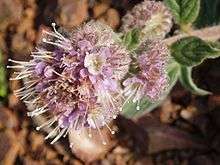Phacelia
| Phacelia | |
|---|---|
 | |
| Phacelia tanacetifolia | |
| Scientific classification | |
| Kingdom: | Plantae |
| (unranked): | Angiosperms |
| (unranked): | Eudicots |
| (unranked): | Asterids |
| Order: | (see text) |
| Family: | Boraginaceae |
| Subfamily: | Hydrophylloideae |
| Genus: | Phacelia Juss. |
| Type species | |
| Phacelia secunda | |
| Diversity | |
| About 200 species | |
| Synonyms | |
|
Eutoca R.Br. | |
Phacelia (phacelia, scorpionweed, heliotrope) is a genus of about 200 species of annual or perennial herbaceous plants, native to North and South America.[1]
The genus is traditionally placed at family rank with the waterleaves (Hydrophyllaceae) in the order Boraginales. The Angiosperm Phylogeny Group, recognizing that the traditional Boraginaceae and Hydrophyllaceae are paraphyletic with respect to each other, merges the latter into the former and considers the family basal in the Euasterids I clade. Other botanists[2] continue to recognize the Hydrophyllaceae and Boraginales, but to make them monophyletic the present genus be moved to the Boraginaceae.
Many species are cultivated as garden plants and honey plants.
As with many species in the Boraginaceae, contact with the hairs of some species of Phacelia can cause a very unpleasant rash similar to that from poison oak and poison ivy in sensitive individuals. The major contact allergen of Phacelia crenulata has been identified as geranylhydroquinone. The similar-appearing species Eriodictyon parryi (poodle-dog bush), a common chaparral plant of Southern California, is also a frequent cause of skin irritation.
Selected species
|
|

 Phacelia bicolor
Phacelia bicolor
 Phacelia congesta
Phacelia congesta


 Phacelia secunda
Phacelia secunda

See also
References
Further reading
- Gilbert, C.; Dempcy, J.; Ganong, C.; Patterson, R.; Spicer, G.S. (2005): Phylogenetic Relationships within Phacelia subgenus Phacelia (Hydrophyllaceae) Inferred From Nuclear rDNA ITS Sequence Data. Systematic Botany 30(3): 627-634.
- Gottschling, M.; Hilger, H.H.; Wolf, M. & Diane, N. (2001): Secondary structure of the ITS1 transcript and its application in a reconstruction of the phylogeny of Boraginales. Plant Biology 3: 629–636.
- Olmstead, R.G.; Kim, K-J.; Jansen, R.K. & Wagstaff, S.J. (2000): The phylogeny of the Asteridae sensu lato based on chloroplast ndhF gene sequences. Mol. Phylogenet. Evol. 16: 96–112.
External links
| Wikimedia Commons has media related to Phacelia. |
- Panorama of a Phacelia Field (QuickTime required)